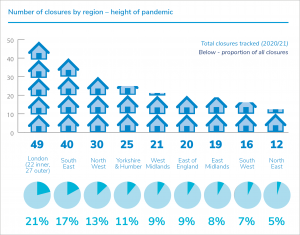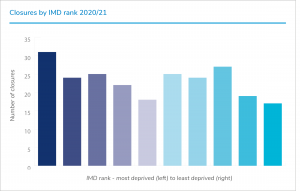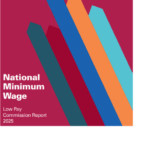Closures of nurseries increase as impact of pandemic takes hold
National Day Nurseries Association (NDNA) has published its report Nurseries and the impact of closures in the first year of the pandemic which revealed that the number of nursery closures in England has increased by 35% during the height of the Covid-19 pandemic compared to the same period the previous year.

Throughout the pandemic, nurseries and childcare providers have supported children and families with high quality early education and care. This is despite facing more than 15 months of uncertainty and higher operating costs while seeing their incomes hit by reduced attendance, temporary closures and staff absences.
In a blow to efforts to address the attainment gap, the highest numbers of closures (13.4%) were found in the 10% most deprived areas in the country. More than a third of closures (34.5%) were in the top 30% deprived areas between April 2020 and March 2021.
The analysis also shows that almost three quarters (72.4%) of the overall closures were in areas with a funding rate of £5 or less per hour of funded childcare. The research, carried out at the end of this financial year, revealed that 38.4% of all closures were in London and the South East combined.
Based on available data for 167 of the 232 closures, over 11,000 children’s places (11,041) were affected, with the true figure likely to be much higher.
Purnima Tanuku OBE, Chief Executive of NDNA, said: “Year after year we have seen nurseries and childcare settings struggle to make ends meet on the funding they receive from Government. Now we are seeing that the pressures of the pandemic have been the final straw for even more nurseries.
“Children have already missed out on so much through this pandemic, those in nursery have spent large parts of their life under lockdown conditions, the last thing they need is the upheaval of their setting closing. Early years has to be the foundation of the Government’s education recovery plans if we are to avoid a lost generation of young learners.
“We are extremely worried that the highest proportion of closures took place in the most deprived areas of England where the children are most in need of the high quality early education and care these nurseries deliver. Without this best start in life, the attainment gap will continue to widen.
“Government statistics show that even now in the busiest summer term, only 58% of children are currently in nursery. This means nursery businesses have lower than usual income to cover higher operating costs. The latest government figures show a shocking drop in the take up of two year old places, demonstrating just how much ground there is to make up.

“The latest 1.2% increase in hourly rates for children’s places did not even cover the statutory increases to National Minimum and Living Wage levels.
“Children need to be able to access the high quality education and care that nurseries can provide to support their development and life-long learning. At the same time, working parents need affordable and accessible childcare options. Without targeted financial support, many more nurseries will face closure, a heart-breaking decision for staff, children and their families.”
NDNA’s report identifies eight urgent actions for the Government including urgent investment to support nursery sustainability, ensuring early years funding supports the delivery of high quality early education through the Comprehensive Spending Review and simplifying the funding system for both parents and providers.
Other key findings include:
- Closures took place in areas with the lowest funding rates. 38.4% of closures were in areas receiving the lowest funding rate of £4.38 in 2020/21
- In this 12 month period, Ofsted data shows a net loss of 442 nurseries and pre-schools from
- Ofsted’s Early Years Register
- Ofsted’s Early Years Register showed a net reduction of 3,025 providers across all categories from 01 April 2020 – 31 March 2021.
Ahead of the Government’s Comprehensive Spending Review in the autumn, NDNA is looking at how nursery places are funded and how childcare providers have been impacted through a short survey with nurseries.
Nursery owner Alison Dyke who recently had to close her award-winning outstanding nursery Pathfinders in the West Midlands said: “Since the beginning of the pandemic, we have invested huge amounts of time, effort and our own money to ‘prop up’ the business for the sake of the families using the service and to ensure that we maintained an exceptional quality of care and learning opportunities for the children and families at our nursery.
“The physical, emotional and financial demands of running a nursery in the current climate have become too much.”
Nursery case study – Alison Dyke
We had to make the difficult decision to close Pathfinders Nursery at Easter 2021 following 17 years in childcare, previously owning Nature Trails @ Crescent.
Among the reasons which contributed to our closure included the emotional and physical demands of running a nursery. This is exacerbated by the private nursery sector being disrespected and undervalued by the Government which does not support their work in a meaningful way.
We have been consistently paid low funding rates but with rising costs. There is a lack of Government support – it’s too little, too late.
Then we also had to cope with the effects of the pandemic – not all parents accepting retainer fees, hardly any grant support (it took a lot to get what we did), bubbles shutting down, staff: child ratios. We had to work throughout the pandemic despite taking a step back from duties.
We have always loved working in a sector that gives daily reinforcement of the joy of caring for and educating young children and are very sad that the sector is treated like second-class citizens, despite all that we have done to support the economy and families – we are disrespected and undervalued.
The rewards of running a PVI nursery are not worth the effort or toll it has taken on our free time, finances or health.
Download ‘Nurseries and the impact of closures in the first year of the pandemic’ here
- England
- Covid-19 pandemic
- early education
- early years
- England
- nursery closures
Similar Articles
Government research shows school-based nurseries are not delivering flexible provision to its communities

One in seven childcare professionals paid around minimum wages


